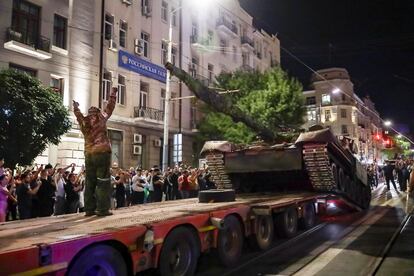Putin, on the edge of the precipice
The Russian president came out of the crisis caused by the Wagner rebellion weakened, but he has not yet been defeated. He has merely avoided a decisive fall

Nothing is what it seems. Everything is smoke and mirrors. The only truth remains hidden. We do not even know the number of the victims caused by last Saturday’s clashes between the Wagner Group and the Russian military. Vladimir Putin paid tribute to them with a minute of silence but provided amnesty to those responsible for their death a minute later. The dead do not count where death reigns.
The claimed victory is the civil war that has been avoided. It is necessary to consider the meaning of such a feat. Yevgeny Prigozhin’s column reached to within 125 miles of the Kremlin, without anyone blocking its way on land. Some of the planes and helicopters that attempted to do so were shot down, in a worse balance of casualties than one day in Ukraine.
A massacre that would have forced Russia to abandon the Ukrainian front was avoided. Wagner faced certain defeat, perhaps within a few hours. The very high price paid to prevent it is understandable. Putin’s presidential authority is at rock bottom. The initially unmentionable war has penetrated Russian territory. It is being felt by its citizens. The capital of stability and predictability represented by autocracy — precisely that which is most valued by a Chinese neighbor that declared unlimited friendship — has gone down the drain. Russia is at war.
Putin has the consolation that it was not the classic civil confrontation that precedes the fall of the regime. Victorious in Chechnya, Georgia, Syria and, above all, Crimea, he now moves from defeat to defeat. He is a proven loser. Even the bloody and pyrrhic victory of Bakhmut was not his, gained instead by the now exiled Prigozhin at the head of his mercenary army.
No one may give his nuclear bluster credence, although the destruction of the Nova Kakhovka dam and the threat hanging over the Zaporizhzhia nuclear power plant point to the disturbing apocalyptic impulse beating in his head. Now the nuclear fear has shifted to the chaos that may result from Putin’s downfall, or even an implosion of the Russian Federation.
Prigozhin’s mutiny was good for Ukraine, but it could have been even better. It distracted Moscow’s attention, but it did not distract its troops. Putin has disbanded his most feared and cruel legions. There will be little for Wagner’s mercenaries to contribute to his bureaucratized and corrupt army. We do not know what those displaced to Belarus will do, nor those deployed in Africa and Syria, nor whether they will be under the control of Prigozhin or Sergei Shoigu, a Minister of Defense who could have direct command over African territories, like a former imperial viceroy.
Putin came out of the crisis weakened, but he has not yet been defeated. He has merely avoided a decisive fall. He is surrounded by losers. Aleksander Lukashenko, peacemaker and apparent hero of the day, is only a survivor in servitude. He is clinging on thanks to Putin and will fall with Putin. Once civil war rears its inhuman snout, it is difficult for it not to return with greater impetus and in search of more blood.
Sign up for our weekly newsletter to get more English-language news coverage from EL PAÍS USA Edition
Tu suscripción se está usando en otro dispositivo
¿Quieres añadir otro usuario a tu suscripción?
Si continúas leyendo en este dispositivo, no se podrá leer en el otro.
FlechaTu suscripción se está usando en otro dispositivo y solo puedes acceder a EL PAÍS desde un dispositivo a la vez.
Si quieres compartir tu cuenta, cambia tu suscripción a la modalidad Premium, así podrás añadir otro usuario. Cada uno accederá con su propia cuenta de email, lo que os permitirá personalizar vuestra experiencia en EL PAÍS.
¿Tienes una suscripción de empresa? Accede aquí para contratar más cuentas.
En el caso de no saber quién está usando tu cuenta, te recomendamos cambiar tu contraseña aquí.
Si decides continuar compartiendo tu cuenta, este mensaje se mostrará en tu dispositivo y en el de la otra persona que está usando tu cuenta de forma indefinida, afectando a tu experiencia de lectura. Puedes consultar aquí los términos y condiciones de la suscripción digital.









































